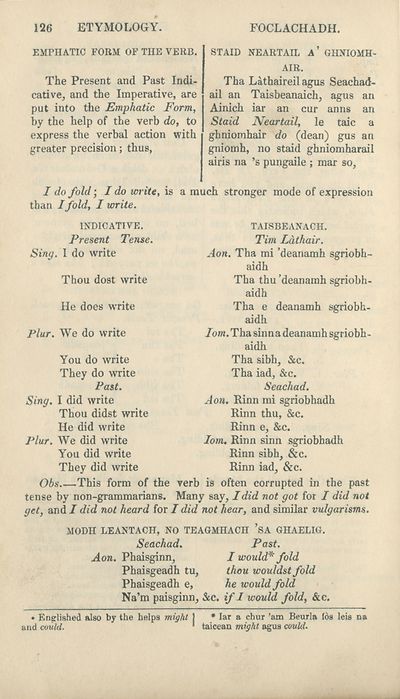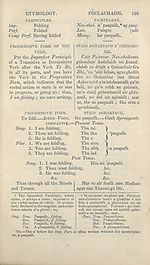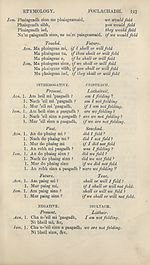Books and other items printed in Gaelic from 1841 to 1870 > Double grammar, of English and Gaelic, in which the principles of both languages are clearly explained
(128) Page 126
Download files
Complete book:
Individual page:
Thumbnail gallery: Grid view | List view

126 ETYMOLOGY.
EMPHATIC FORM OF THE VERB.
The Present and Past Indi¬
cative, and the Imperative, are
put into the Emphatic Form,
by the help of the verb do, to
express the verbal action with
greater precision; thus,
FOCLACHADH.
STAID NEARTAIL a’ GHNIOMH-
AIR.
Tha Lathaireil agus Seachad-
ail an Taisbeanaich, agus an
Ainich iar an cur an ns an
Staid Neartail, le taic a
ghniomhair do (dean) gus an
gniomh, no staid ghniomharail
airis na ’s pungaile ; mar so.
I do fold; / do write, is a much stronger mode of expression
than Ifold, I write.
INDICATIVE.
Present Tense.
Siny. 1 do write
Thou dost write
He does write
Plur. We do write
You do write
They do write
Past.
Sing. I did write
Thou didst write
He did write
Plur. We did write
You did write
They did write
TAISBEANACH.
Tim Ldthair.
Aon. Tha mi ’deanamh sgriobh-
aidh
Tha thu ’deanamh sgriobh-
aidh
Tha e deanamh sgriobh-
aidh
Tom. Tha sinna deanamh sgriobh-
aidh
Tha sibh, &c.
Tha iad, &c.
Seachad.
Aon. Rinn mi sgriobhadh
Rinn thu, &c.
Rinn e, &c.
lorn. Rinn sinn sgriobhadh
Rinn sibh, &c.
Rinn iad, &c.
Obs This form of the verb is often corrupted in the past
tense by non-grammarians. Many say, I did not got for I did not
yet, and I did not heard (ox I did not hear, and similar vulgarisms.
MODH LEANTACH, NO TEAGMHACH ’SA GHAELIG.
Seachad. Past.
Aon. Phaisginn, I would* fold
Phaisgeadh tu, thou wouldst fold
Phaisgeadh e, he would fold
Na’m paisginn, &c. if I would fold, &c.
• Enelished also by the helps might
and could.
* lar a chur ’am Beurla fos leis na
taicean might agus could.
EMPHATIC FORM OF THE VERB.
The Present and Past Indi¬
cative, and the Imperative, are
put into the Emphatic Form,
by the help of the verb do, to
express the verbal action with
greater precision; thus,
FOCLACHADH.
STAID NEARTAIL a’ GHNIOMH-
AIR.
Tha Lathaireil agus Seachad-
ail an Taisbeanaich, agus an
Ainich iar an cur an ns an
Staid Neartail, le taic a
ghniomhair do (dean) gus an
gniomh, no staid ghniomharail
airis na ’s pungaile ; mar so.
I do fold; / do write, is a much stronger mode of expression
than Ifold, I write.
INDICATIVE.
Present Tense.
Siny. 1 do write
Thou dost write
He does write
Plur. We do write
You do write
They do write
Past.
Sing. I did write
Thou didst write
He did write
Plur. We did write
You did write
They did write
TAISBEANACH.
Tim Ldthair.
Aon. Tha mi ’deanamh sgriobh-
aidh
Tha thu ’deanamh sgriobh-
aidh
Tha e deanamh sgriobh-
aidh
Tom. Tha sinna deanamh sgriobh-
aidh
Tha sibh, &c.
Tha iad, &c.
Seachad.
Aon. Rinn mi sgriobhadh
Rinn thu, &c.
Rinn e, &c.
lorn. Rinn sinn sgriobhadh
Rinn sibh, &c.
Rinn iad, &c.
Obs This form of the verb is often corrupted in the past
tense by non-grammarians. Many say, I did not got for I did not
yet, and I did not heard (ox I did not hear, and similar vulgarisms.
MODH LEANTACH, NO TEAGMHACH ’SA GHAELIG.
Seachad. Past.
Aon. Phaisginn, I would* fold
Phaisgeadh tu, thou wouldst fold
Phaisgeadh e, he would fold
Na’m paisginn, &c. if I would fold, &c.
• Enelished also by the helps might
and could.
* lar a chur ’am Beurla fos leis na
taicean might agus could.
Set display mode to:
![]() Universal Viewer |
Universal Viewer | ![]() Mirador |
Large image | Transcription
Mirador |
Large image | Transcription
Images and transcriptions on this page, including medium image downloads, may be used under the Creative Commons Attribution 4.0 International Licence unless otherwise stated. ![]()
| Permanent URL | https://digital.nls.uk/106541301 |
|---|
| Description | Out-of-copyright books printed in Gaelic between 1631 and 1900. Also some pamphlets and chapbooks. Includes poetry and songs, religious books such as catechisms and hymns, and different editions of the Bible and the Psalms. Also includes the second book ever published in Gaelic in 1631. |
|---|

